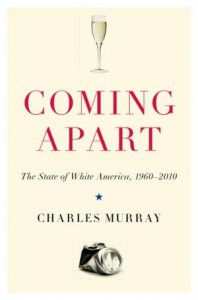 I’ve I been reading Charles Murray’s troubling and troublesome new book, Coming Apart: The State of White America, 1960-2010. The opinion class has been talking about the book since it came out in January. The New York Times mostly hates and the Wall Street Journal mostly loves it. I mostly agree with both of them.
I’ve I been reading Charles Murray’s troubling and troublesome new book, Coming Apart: The State of White America, 1960-2010. The opinion class has been talking about the book since it came out in January. The New York Times mostly hates and the Wall Street Journal mostly loves it. I mostly agree with both of them.
Murray is a sociologist and a libertarian and with an unrelenting barrage of facts and figures paints a picture of white America (he uses the demographic data for white America because it is more readily available and, he thinks, tells an important story because it remains the story of the majority).
Murray uses his data to argue that white America is coming apart, increasingly divided, with a 20% “new upper class” made up of the cognitive elite on one side and a 30% “new lower class” made up of the socially marginal and unable on the other side. He is harsh in his assessment of the members of elite new upper class who are cloistered in their affluence, living in what are termed the superzips (zip codes where average income and educational attainment are both above the 95th percentile). But he finds the growing white underclass to be the greater threat to what he calls the American project.
Quoting Benjamin Franklin who said, “Only a virtuous people are capable of freedom,” Murray chooses four foundational American virtues from a survey of the writings of the founders and European visitors to the young republic. His four virtues are industriousness, honesty, marriage and religiosity. Murray believes that all four virtues were relatively strong and accepted in all strata of American society 50 years ago, but that they have eroded and disastrously so, especially in what was once working class America, the new underclass.
Progressives are not so much interested in arguing with Murray’s assessment (though they disagree strongly with it at some points) as they are in disputing the cause of what Murray sees. They would point to economic dislocation, the loss of a living wage, as the primary cause of social disintegration among the working poor. Conservatives too easily dismiss it all as being rooted in a character flaw in those not willing to adapt to new realities or having been conned into thinking that virtue does not matter.
Read the book and let me know what you think. I’d love to hear from you.
Of course, I have a particular interest in the faith or religiosity aspect of Murray’s argument. Murray crunches his various numbers to create an assessment of “core religious participation.” Core participation is much more than affiliation. Persons with high scores are those who worship regularly, support mission and ministry with time and financial resources, look to Scripture and prayer for guidance and support and are well connected to a local faith body. By his reckoning, the percentage of all Americans marked by core religious participation reached an historic high sometime in the late 1950’s or early 60’s – probably in the low 30% range, about a third of the population. Gallup, Barna and every other assessment I have seen would concur with Murray’s findings.
But Murray points out that core religious participation has never been as high among the working poor as among their wealthier, better educated, socially able brothers and sisters. Beginning in 1970 when data becomes widely available, he marks a decline in the lower strata from 22% core participation to under twelve percent and still falling precipitously.
He writes, “…the reduction from 22% in the first half of the 1970’s to 12 percent in the last half of the 2000’s does seem significant from any perspective. Such a small figure leaves the religious core not as a substantial minority that is still large enough to be a major force in the community, but as a one-out-of-eight group of people who are increasingly seen as oddballs.”
If Murray is right, and I think he is on this score, then you and I as faithful, committed, joyful followers of Jesus are and increasingly will be seen by our friends, neighbors, fellow workers, bosses, teachers, brothers and sisters as an irrelevant group of oddballs.
It’s likely that we never were as well liked and respected in 1960 as we thought we were. And the fact of the matter is that the Gospel has never much cared about things like superzips. Apparently none of the Corinthian Christians came from the better zip codes in their city, “For consider your calling, brothers: not many of you were wise according to worldly standards, not many were powerful, not many were of noble birth.” (1 Corinthians 1:26)
Oh, and it is a matter of historical record that this irrelevant group of oddballs who were mockingly called Christians turned the world upside down – insisting that dignity, life, justice, reconciliation with God and with others is always more important than power, possessions or pleasure. Maybe we can do it again. Turn the world upside down, that is.
March 16 – A Group of Oddballs
Leave a reply
